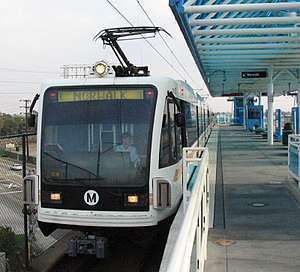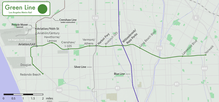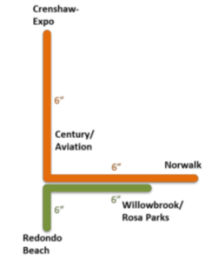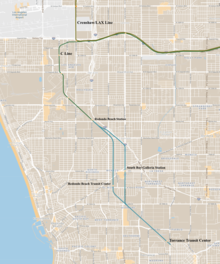C Line (Los Angeles Metro)
The C Line is a 20-mile (32 km)[3] light rail line running between Redondo Beach and Norwalk within Los Angeles County. It is one of six lines forming the Los Angeles Metro Rail system. Having opened on August 12, 1995 as the Green Line, it also serves El Segundo, Hawthorne, South Los Angeles, Lynwood, Downey, Paramount and Willowbrook (in South Los Angeles). A free shuttle bus to Los Angeles International Airport (LAX) is available at the line's Aviation/LAX Station. The line is the only one in the entire Metro Rail system not to serve Downtown Los Angeles but passengers can reach it by connecting with the J Line busway at the Harbor Freeway Station, the A Line light rail at Willowbrook Station, or Metro Express 460 at Norwalk Station. The fully grade-separated route runs mostly in the median of the Century Freeway (Interstate 105), with a separate mostly elevated section to the west.
| C Line | |||||||||||||||||||||||||||||||||||||||||||||||||||||||||||||||||||||||||||||||||||||||||||||||||||||||||||||||||||||||||||||||||||||||||||||||||||||||||||||||||||||||||||||||||||||||||||||||||||||||||||||||||||
|---|---|---|---|---|---|---|---|---|---|---|---|---|---|---|---|---|---|---|---|---|---|---|---|---|---|---|---|---|---|---|---|---|---|---|---|---|---|---|---|---|---|---|---|---|---|---|---|---|---|---|---|---|---|---|---|---|---|---|---|---|---|---|---|---|---|---|---|---|---|---|---|---|---|---|---|---|---|---|---|---|---|---|---|---|---|---|---|---|---|---|---|---|---|---|---|---|---|---|---|---|---|---|---|---|---|---|---|---|---|---|---|---|---|---|---|---|---|---|---|---|---|---|---|---|---|---|---|---|---|---|---|---|---|---|---|---|---|---|---|---|---|---|---|---|---|---|---|---|---|---|---|---|---|---|---|---|---|---|---|---|---|---|---|---|---|---|---|---|---|---|---|---|---|---|---|---|---|---|---|---|---|---|---|---|---|---|---|---|---|---|---|---|---|---|---|---|---|---|---|---|---|---|---|---|---|---|---|---|---|---|---|
 | |||||||||||||||||||||||||||||||||||||||||||||||||||||||||||||||||||||||||||||||||||||||||||||||||||||||||||||||||||||||||||||||||||||||||||||||||||||||||||||||||||||||||||||||||||||||||||||||||||||||||||||||||||
 P2000 train at Redondo Beach station | |||||||||||||||||||||||||||||||||||||||||||||||||||||||||||||||||||||||||||||||||||||||||||||||||||||||||||||||||||||||||||||||||||||||||||||||||||||||||||||||||||||||||||||||||||||||||||||||||||||||||||||||||||
| Overview | |||||||||||||||||||||||||||||||||||||||||||||||||||||||||||||||||||||||||||||||||||||||||||||||||||||||||||||||||||||||||||||||||||||||||||||||||||||||||||||||||||||||||||||||||||||||||||||||||||||||||||||||||||
| Other name(s) | Green Line (1995–2020) K Line (Redondo Beach–Willowbrook; 2021) | ||||||||||||||||||||||||||||||||||||||||||||||||||||||||||||||||||||||||||||||||||||||||||||||||||||||||||||||||||||||||||||||||||||||||||||||||||||||||||||||||||||||||||||||||||||||||||||||||||||||||||||||||||
| Type | Light rail | ||||||||||||||||||||||||||||||||||||||||||||||||||||||||||||||||||||||||||||||||||||||||||||||||||||||||||||||||||||||||||||||||||||||||||||||||||||||||||||||||||||||||||||||||||||||||||||||||||||||||||||||||||
| System | Los Angeles Metro Rail | ||||||||||||||||||||||||||||||||||||||||||||||||||||||||||||||||||||||||||||||||||||||||||||||||||||||||||||||||||||||||||||||||||||||||||||||||||||||||||||||||||||||||||||||||||||||||||||||||||||||||||||||||||
| Termini | Redondo Beach Norwalk | ||||||||||||||||||||||||||||||||||||||||||||||||||||||||||||||||||||||||||||||||||||||||||||||||||||||||||||||||||||||||||||||||||||||||||||||||||||||||||||||||||||||||||||||||||||||||||||||||||||||||||||||||||
| Stations | 14 | ||||||||||||||||||||||||||||||||||||||||||||||||||||||||||||||||||||||||||||||||||||||||||||||||||||||||||||||||||||||||||||||||||||||||||||||||||||||||||||||||||||||||||||||||||||||||||||||||||||||||||||||||||
| Daily ridership | 36,141 (July 2016; avg. weekday)[1][2] | ||||||||||||||||||||||||||||||||||||||||||||||||||||||||||||||||||||||||||||||||||||||||||||||||||||||||||||||||||||||||||||||||||||||||||||||||||||||||||||||||||||||||||||||||||||||||||||||||||||||||||||||||||
| Line number | 803 | ||||||||||||||||||||||||||||||||||||||||||||||||||||||||||||||||||||||||||||||||||||||||||||||||||||||||||||||||||||||||||||||||||||||||||||||||||||||||||||||||||||||||||||||||||||||||||||||||||||||||||||||||||
| Website | Green Line | ||||||||||||||||||||||||||||||||||||||||||||||||||||||||||||||||||||||||||||||||||||||||||||||||||||||||||||||||||||||||||||||||||||||||||||||||||||||||||||||||||||||||||||||||||||||||||||||||||||||||||||||||||
| Operation | |||||||||||||||||||||||||||||||||||||||||||||||||||||||||||||||||||||||||||||||||||||||||||||||||||||||||||||||||||||||||||||||||||||||||||||||||||||||||||||||||||||||||||||||||||||||||||||||||||||||||||||||||||
| Opened | August 12, 1995 | ||||||||||||||||||||||||||||||||||||||||||||||||||||||||||||||||||||||||||||||||||||||||||||||||||||||||||||||||||||||||||||||||||||||||||||||||||||||||||||||||||||||||||||||||||||||||||||||||||||||||||||||||||
| Operator(s) | |||||||||||||||||||||||||||||||||||||||||||||||||||||||||||||||||||||||||||||||||||||||||||||||||||||||||||||||||||||||||||||||||||||||||||||||||||||||||||||||||||||||||||||||||||||||||||||||||||||||||||||||||||
| Character | Predominantly elevated and fully grade-separated, mostly in freeway median. | ||||||||||||||||||||||||||||||||||||||||||||||||||||||||||||||||||||||||||||||||||||||||||||||||||||||||||||||||||||||||||||||||||||||||||||||||||||||||||||||||||||||||||||||||||||||||||||||||||||||||||||||||||
| Rolling stock | Trains run in 1–2 car consists | ||||||||||||||||||||||||||||||||||||||||||||||||||||||||||||||||||||||||||||||||||||||||||||||||||||||||||||||||||||||||||||||||||||||||||||||||||||||||||||||||||||||||||||||||||||||||||||||||||||||||||||||||||
| Technical | |||||||||||||||||||||||||||||||||||||||||||||||||||||||||||||||||||||||||||||||||||||||||||||||||||||||||||||||||||||||||||||||||||||||||||||||||||||||||||||||||||||||||||||||||||||||||||||||||||||||||||||||||||
| Line length | 20.0 mi (32.2 km)[3] | ||||||||||||||||||||||||||||||||||||||||||||||||||||||||||||||||||||||||||||||||||||||||||||||||||||||||||||||||||||||||||||||||||||||||||||||||||||||||||||||||||||||||||||||||||||||||||||||||||||||||||||||||||
| Number of tracks | 2 | ||||||||||||||||||||||||||||||||||||||||||||||||||||||||||||||||||||||||||||||||||||||||||||||||||||||||||||||||||||||||||||||||||||||||||||||||||||||||||||||||||||||||||||||||||||||||||||||||||||||||||||||||||
| Track gauge | 4 ft 8 1⁄2 in (1,435 mm) (standard gauge) | ||||||||||||||||||||||||||||||||||||||||||||||||||||||||||||||||||||||||||||||||||||||||||||||||||||||||||||||||||||||||||||||||||||||||||||||||||||||||||||||||||||||||||||||||||||||||||||||||||||||||||||||||||
| Electrification | 750 V DC overhead catenary | ||||||||||||||||||||||||||||||||||||||||||||||||||||||||||||||||||||||||||||||||||||||||||||||||||||||||||||||||||||||||||||||||||||||||||||||||||||||||||||||||||||||||||||||||||||||||||||||||||||||||||||||||||
| Operating speed | 65 mph (105 km/h) | ||||||||||||||||||||||||||||||||||||||||||||||||||||||||||||||||||||||||||||||||||||||||||||||||||||||||||||||||||||||||||||||||||||||||||||||||||||||||||||||||||||||||||||||||||||||||||||||||||||||||||||||||||
| |||||||||||||||||||||||||||||||||||||||||||||||||||||||||||||||||||||||||||||||||||||||||||||||||||||||||||||||||||||||||||||||||||||||||||||||||||||||||||||||||||||||||||||||||||||||||||||||||||||||||||||||||||
The Crenshaw/LAX Line project, scheduled to open in 2021, will be integrated with much of the current C Line, creating two separate lines. One will operated along the current corridor between Willowbrook/Rosa Parks station and Redondo Beach station, while another will run from Norwalk along the current C Line before turning onto the newly built infrastructure and terminating at Expo/Crenshaw station.[4]
Service description
Route

The entire route of the C Line is grade-separated, with its tracks following a fully elevated route, either on a guideway or in the median of the Century Freeway (Interstate 105). The line begins in the west at Redondo Beach station, then heads roughly north through El Segundo. At Aviation/LAX, passengers can transfer to any one of several bus lines from different operators, particularly Shuttle Bus "G", a shuttle bus from the C Line to LAX. From here, the C Line heads east in the median of the Century Freeway, with a connection to the Metro Silver Line bus rapid transit line at the Harbor Freeway Station. It then continues to a major transfer connection at the Willowbrook Station (transfer point to the A Line). Finally, the line terminates in the city of Norwalk, just east of the 605 Freeway.
The C Line is the fastest light rail line in the Metro rail network, with trains typically operating at 55–65 mph on the I-105 freeway portion. When the C Line began service in 1995, it operated with only one-car trains. As ridership increased, two-car trains were then used. Ridership on the C Line has not been as high as the A Line, although it did have a higher ridership than the L Line (Gold) until 2013.[1][2] Although nearly all of the C Line stations were built to accommodate three-car trains, the C Line has never used trains consisting of more than two cars. The stations west of Aviation/LAX Station were not built to accommodate three-car trains.
Hours of operation
Metro C Line trains run between approximately 3:30 a.m. and midnight daily.[5] Service on Friday and Saturday nights continues until approximately 2:15 a.m. The C Line runs with one-car trains in the early mornings (3:35 A.M.–5:30 A.M.) and late evenings (9:00P.M.–12:55 A.M.) First and last train times are as follows:
To Norwalk Station
- Eastbound
- First Train to Norwalk from Willowbrook/Rosa Parks Station: 3:33 a.m.
- First Train to Norwalk from Douglas Station: 3:41 a.m.
- Last Train to Norwalk: 11:59 p.m. (2:01 a.m. Friday and Saturday nights)
To Redondo Beach Station
- Westbound
- First Train to Redondo Beach Station: 4:04 a.m.
- Last Train to Redondo Beach Station: 12:50 a.m. (2:12 a.m. Friday and Saturday nights)
Headways
Trains on the C Line operate every seven to eight minutes during peak hours Monday through Friday. They operate every 15 minutes during the midday and all day on the weekends, with night service running every 20 minutes.[5]
History
In 1972, Caltrans signed a consent decree to allow construction of the fiercely opposed Century Freeway (Interstate 105), which included provisions for a transit corridor in the freeway's median. Construction began in 1987 on the line as a light rail line, with a route mostly following I-105 but a short section in the South Bay following the Harbor Subdivision. The western alignment was originally planned and partially constructed to connect with Los Angeles International Airport (LAX), but the airport was planning a major renovation during the line's construction. Los Angeles World Airports wanted the connection to LAX to be integrated with this construction, but the Federal Aviation Administration voiced concerns that the overhead lines of the rail line would interfere with the landing paths of airplanes.[6]
Future extensions
Various studies have suggested extending the C Line north to LAX, Westchester, Loyola Marymount University, and even Santa Monica. A possible southern extension could take the C Line's southern terminus farther southeast, to the South Bay Galleria or beyond. And on the line's east end, the line may one day be extended from its current terminus at Norwalk station to Norwalk/Santa Fe Springs station.[7]
Integration with Crenshaw/LAX Line

The Crenshaw/LAX Line project extends from the existing C Line, and the question of how the new segment would be integrated into the Metro Rail system was the subject of some controversy in 2018 as completion of the project loomed. Early proposals had suggested that a new line would operate between Expo/Crenshaw station in the north and Aviation/Century in the south, or possibly extend to Redondo Beach station once the stations west of Aviation/LAX station could accommodate 3-car trains, with the stretch southwest of the wye continuing to be served by the Metro C Line as well.[8] An additional service would have connected Norwalk to the new Aviation/Century station and planned 96th Street Transit station and the Airport Metro Connector.[9]
But this would require trains passing all three directions through the wye connecting the new and existing infrastructure, which Metro staff felt would unduly wear down the points. Instead, in 2018 Metro proposed a service plan that would see the newly opened segment connected to the bulk of the current C Line; the southwest segment of the C Line in the South Bay would operate as a separate shuttle between Redondo Beach and the new Aviation/Century station. The arrangement was meant to provide a seamless rail option for the many passengers who currently transfer between the C Line and north-south bus lines in the area, as well as operationally combine the Norwalk-LAX and Crenshaw/Expo-LAX legs, which have matching capacity needs, rather than combining either with the more sparsely used Redondo Beach leg.[10]
However, the plan was met with resistance from some board members, particularly Supervisor Janice Hahn, because it would require South Bay passengers to make multiple transfers to complete trips currently possible with only one transfer.[11] A faction of the Metro board led by Hahn proposed a one-year pilot of an alternative routing scheme under which one line would travel from Norwalk to Expo/Crenshaw and another from Redondo Beach to Willowbrook/Rosa Parks. The proposal, dubbed C-3, was approved by the Metro board on December 6, 2018.[12] This option will entail an additional $10 million annual operating cost over Metro's initial proposal, in large part because a substantial segment of the current C Line between Willowbrook and Aviation/LAX will see three-minute headways at peak hours. The adopted proposal will also limit the potential length of trains on the new segment to two cars due to power constraints, and will preclude a one-seat ride from the South Bay to LAX,[13] but will maintain the ability of South Bay passengers to transfer directly to the J and A Lines.
Southern Extension to South Bay
Metro is currently working on the initial environmental study of a corridor extension of the C Line from its Redondo terminus toward the southeast. The "South Bay Metro C Line Extension" would roughly follow the Harbor Subdivision ROW into the South Bay, to the Torrance Regional Transit Center (RTC).[14]
Metro and the public are considering two alternatives in the DEIR: an elevated light-rail extension, and an at-grade extension over existing tracks, with vehicle type still to be determined. Study of the South Bay Extension will lead to publication of a Draft Environmental Impact Report (DEIR). The study was expected to be completed in 2011. Project was placed on hold in Spring 2012 due to uncertain funding. With the passage of Measure M in 2016, $619 million was cited for the Green Line Extension south and the study resumed. The (EIR/EIS) resumed, which is currently scheduled for mid 2020 release.[15]
Metro authorized two of four alternatives to move forward. Alternative #1 and Alternative #3. Metro staff recommended the two alternatives into the DEI/EIS status for further analysis and refinement in September 2018. The study area includes the former Harbor Subdivisions right of way. The extension study includes the Redondo Beach station to the Torrance Transit Center, a 4.5 mile extension study area.[16]

| DEIR Alternative[16] | Description | Ridership (daily) |
Estimated cost (billions) |
|---|---|---|---|
| Alternative 1: ROW Overcrossing | A Light rail transit (LRT) line heading south from the Redondo Beach station on the ROW of Harbor Subdivision. A stop at the Redondo Beach Transit station adjacent Pacific Crest Cemetery between Grant Ave and 182nd st. On 190th st. it continues south along the ROW with a terminus at the Torrance Transit Center. A 7-minute ride. No station at Manhattan blvd./Inglewood Ave. intersection. | 10,340 | $893 m |
| Alternative 3: Hawthorne to 190th St | A LRT line heading southwest. An aerial segment is needed over Manhattan Beach Boulevard to reach Hawthorne Boulevard immediately south of Redondo Beach station. Then heads south on Hawthorne Boulevard. Two new stations, a South Bay Galleria mall station and a station at Torrance Transit Center in Torrance along the Harbor Subdivision ROW at 465 Crenshaw Blvd. A 9-minute ride. | 10,640 | $1 to 1.2 b |
The following table shows all potential metro stations, and the alternatives for which they apply:
| Station Options | Alt 1 | Alt 2 | Connecting Rail/Bus Service | Community |
|---|---|---|---|---|
| Redondo Beach station (already built) | × | × | Redondo Beach | |
| Redondo Beach Transit Center station | × | – | Beach Cities Transit | Redondo Beach |
| South Bay Galleria station | – | × | Redondo Beach | |
| Torrance Transit Center station | × | × | Torrance Transit | Torrance |
According to the LA County Expenditure Plan (Measure M), groundbreaking for the project is currently scheduled for 2026, with expected opening in 2030–2033. The timeline is expected to be accelerated under the Twenty-eight by '28 initiative.[17]
Extension to Norwalk Metrolink
The C Line's eastern terminus suffers from the fact that it stops two miles (3 km) just short of the heavily used Norwalk/Santa Fe Springs Metrolink station, where several Metrolink lines operate. Local bus service is provided between the Metrolink station and the C Line terminus, but schedules are not coordinated with the C Line arrivals. While plans exist to close the gap,[18] available Measure M funding allows for operation to start in roughly 2052.[19][20]
Station listing
The C Line consists of the following 14 stations (from west to east):
| Station | Date Opened | City/ Neighborhood | Major connections and notes[21][22] |
|---|---|---|---|
| Redondo Beach | August 12, 1995 | Hawthorne and Redondo Beach[N 1] | Park and ride: 340 stalls |
| Douglas | El Segundo | Park and ride: 30 stalls | |
| El Segundo | Park and ride: 93 stalls | ||
| Mariposa | |||
| Aviation/LAX | Westchester | Connects with Park and ride: 435 stalls | |
| Hawthorne/Lennox | Hawthorne | Park and ride: 362 stalls | |
| Crenshaw | Park and ride: 506 stalls | ||
| Vermont/Athens | Athens | Park and ride: 155 stalls | |
| Harbor Freeway | South Los Angeles | Connects with Park and ride: 253 stalls | |
| Avalon | Park and ride: 160 stalls | ||
| Willowbrook | Willowbrook | Connects with Park and ride: 234 stalls | |
| Long Beach Boulevard | Lynwood | Park and ride: 635 stalls | |
| Lakewood Boulevard | Downey | Park and ride: 403 stalls | |
| Norwalk | Norwalk | Park and ride: 1,759 stalls | |
- The station straddles two cities. The north end of the station is in the City of Hawthorne, and the south end of the station is in the City of Redondo Beach
Operations
Maintenance facilities
The C Line is operated out of the Division 22 Yard (Aviation Street Yard) and the Division 16 Yard (Southwestern Yard). These yards stores the fleet used on the C line. Light maintenance is done on the fleet in Division 22 where as heavier maintenance is done in Division 16. Division 22 is located between Redondo Beach and Douglas stations. Trains enter the yard via a junction halfway between the two stations. Douglas bound trains (Northbound) may enter but there is no exit track to continue North. Redondo Beach bound trains (Southbound) may enter and exit the Yard to continue south. Division 16 is located on the completed section of the Crenshaw/LAX Line in Westchester.
Rolling stock
At the time the Green Line opened, the line used rolling stock made by Nippon Sharyo similar to those used on the Blue Line. In late 2001, the Nippon Sharyo P2020's were transferred to the Blue Line, and the Green Line received new Siemens P2000 railcars which have been operating on the line ever since. Kinkisharyo P3010 trains are also used. Trains are limited to two-car sets due to limitations at some stations along the line.[23]
Incidents
- On February 22, 2015, a train near the Hawthorne/Lennox station struck and killed a man who was trespassing onto the tracks.[24][25]
- On August 24, 2018, a collision involving a tanker truck on the westbound lanes of the I-105 between Vermont Avenue and Crenshaw Boulevard exploded with flames that crawled onto the Green Line tracks and damaged the catenary system. The Green Line and the freeway as well were temporarily suspended.[26]
Photo gallery
- Mariposa Station information stands.
- Metro Green Line route map on a Siemens P2000 train.
- Metro Green Line train heading to Redondo Beach Station arriving at Douglas Station.
- Redondo Beach Station is currently the western terminus of the Metro Green Line.
References
- "Ridership Statistics – Rail Ridership Estimates". Los Angeles County Metropolitan Transportation Authority. August 20, 2013. Retrieved August 25, 2013.
- "Monthly Ridership Plot" (PDF). Los Angeles County Metropolitan Transportation Authority. November 2013. Retrieved November 16, 2013.
- "Facts at a Glance". Los Angeles County Metropolitan Transportation Authority. Retrieved November 16, 2013.
- https://www.scribd.com/document/393304103/Crenshaw-LAX-Line-and-Green-Line-Operating-Plan-Presentation
- "Maps & Timetables". Los Angeles County Metropolitan Transportation Authority. Retrieved July 16, 2018.
- Maddaus, Gene (January 9, 2008). "Why Green Line stopped short of LAX". Los Angeles Daily News. Retrieved August 7, 2020.
- Weikel, Dan (January 10, 2016). "Closing 2.8-mile transit gap in Norwalk could smooth regional commute". Los Angeles Times. Los Angeles. Retrieved August 12, 2019.
- Sumers, Brian (January 21, 2014). "Metro breaks ground on new $2 billion L.A. Crenshaw/LAX Line". Daily Breeze. Retrieved January 31, 2016.
- Nelson, Laura J. (April 11, 2018). "City Council approves long-awaited people mover to LAX". Los Angeles Times. Archived from the original on April 12, 2018. Retrieved August 12, 2019.
- Linton, Joe (June 22, 2018). "Crenshaw/LAX Line Operations Plan Being Debated, Will Affect Green Line". Streets Blog LA. Los Angeles. Retrieved August 12, 2019.
- Chiland, Elijah (July 3, 2018). "Will the Crenshaw Line strand South Bay riders?". Curbed Los Angeles. Retrieved August 12, 2019.
- StreetsBlogLA [@StreetsblogLA] (December 6, 2018). "Metro bd mtg: Barger votes yes. Hahn Crenshaw/Green C3 motion passes 7-4-2 (Ridley-Thomas, Kuehl abstained)" (Tweet). Retrieved August 12, 2019 – via Twitter.
- Los Angeles Metro (November–December 2018). "Crenshaw/LAX Line and Green Line Operating Plan Presentation". Scribd. Retrieved August 12, 2019.
- Brightwell, Eric (October 13, 2013). "Exploring The South Bay Metro Green Line Extension". KCET. Archived from the original on November 21, 2013. Retrieved November 18, 2013.
- "Green Line Extension to Torrance".
- "Project 2018-0317".
- Sharp, Steven (October 27, 2017). "Here are the 28 Projects that Metro Could Complete Before the 2028 Olympics". Urbanize Los Angeles. Retrieved August 12, 2019.
- "Norwalk Green Line Extension Study". Southern California Association of Governments. Retrieved August 12, 2019.
- Broverman, Neal (January 12, 2017). "A New Metro Extension Could Seamlessly Connect L.A. and the O.C." Los Angeles Magazine. Retrieved August 12, 2019.
- Hymon, Steve (November 8, 2016). "Measure M project descriptions". Metro. The Source. Retrieved August 15, 2020.
- "Metro C Line (Green)". www.metro.net. Retrieved July 23, 2020.
- "Metro Parking Lots by Line". www.metro.net. Retrieved July 23, 2020.
- Nelson, Laura J. (November 24, 2018). "Westside and South Bay clash over how to connect two rail lines". Los Angeles Times. Retrieved November 27, 2018.
- "Pedestrian fatally struck by Green Line train in Hawthorne". ABC 7. KABC-TV. 2019. Retrieved February 23, 2015.
- "Man struck, killed by Metro Green Line train in Hawthorne". Daily Breeze. February 23, 2015. Retrieved August 12, 2019.
- Serna, Joseph; Reyes-Velarde, Alejandra (August 24, 2018). "Eastbound lanes of 105 Freeway in Hawthorne reopened after fiery crash that killed two". Los Angeles Times. Los Angeles. Retrieved August 12, 2019.
